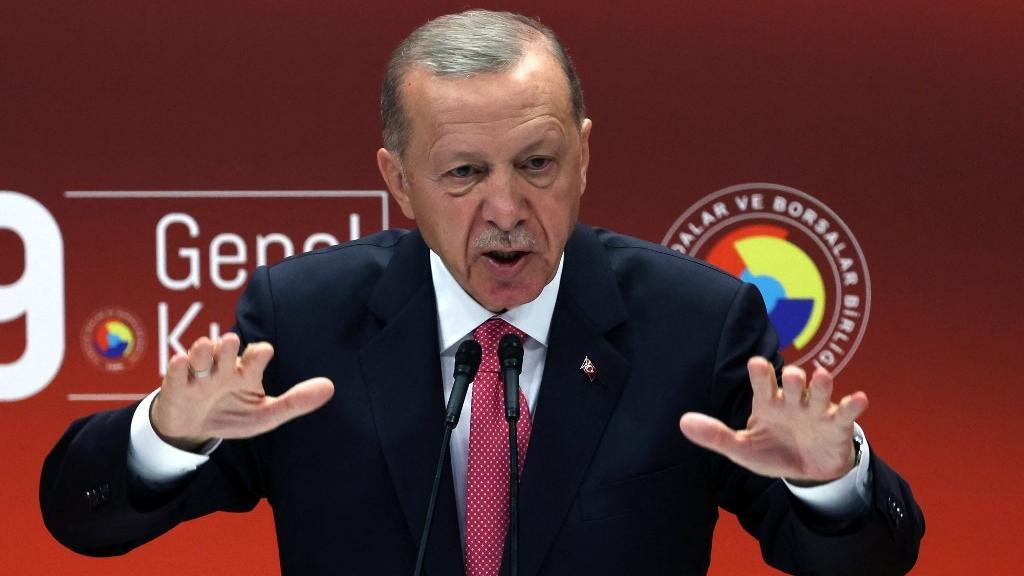Long-serving leader prevails over divided opposition, which failed to understand electorate’s needs
 Turkish President Recep Tayyip Erdogan gives a speech during the 79th General Assembly of the Union of Chambers and Commodity Exchanges of Turkey (TOBB) at TOBB Towers in Ankara, on May 30, 2023. (PHOTO / AFP)
Turkish President Recep Tayyip Erdogan gives a speech during the 79th General Assembly of the Union of Chambers and Commodity Exchanges of Turkey (TOBB) at TOBB Towers in Ankara, on May 30, 2023. (PHOTO / AFP)
Türkiye’s presidential election’s runoff round on May 28 handed victory to current President Recep Tayyip Erdogan, who received more than 52 percent of the votes.
Although Erdogan and his rival, opposition leader Kemal Kilicdaroglu, both increased their share of votes, voter turnout dropped from 89 percent to 85 percent.
Erdogan’s AK Parti (Justice and Development Party) had allied with several partners, such as the strongly nationalist MHP (Nationalist Movement Party), which got 10 percent of the vote in the May 14 parliamentary elections; as well as Sinan Ogan, who had won 5.3 percent of the vote in the first round of the presidential election, which was also held on May 14.
Erdogan’s other small partners included the Yeniden Refah (New Welfare Party), Buyuk Birlik Partisi (Great Unity Party), Demokratik Sol Party (Democratic Left), and Huda-Par (Free Cause Party) — each of whom had picked up a small percentage of the parliamentary vote.
For his part, Kilicdaroglu, leader of the opposition CHP (Republican People’s Party), officially collaborated with Iyi Parti, or the Good Party, who won 9 percent of parliamentary votes, along with smaller parties — Saadet Partisi (Felicity Party), Demokrat Parti (Democrat Party), Demokrasi ve Adalet Partisi (Democracy and Progress Party), and Gelecek Partisi (Future Party).
Kilicdaroglu also unofficially received support from Yeil Sol Parti (Greens and Left: 8 percent), Turkiye Komunist Partisi (Turkish Communist Party), and other small partners. Zafer Partisi (Victory Party: 1 percent) also backed Kilicdaroglu, not Erdogan, for the runoff stage, despite supporting Ogan in the first round.
Erdogan’s coalition partners such as the New Welfare Party and the Free Cause Party have contrasting views on social and women’s rights, as well as issues like gambling and the death penalty.
Kilicdaroglu’s coalition embraces partners with more diverse views, including former compatriots of Erdogan — his former prime minister Ahmet Davutoglu of the Future Party and former deputy prime minister Ali Babacan of the Democracy and Progress Party.
The deep rivalry between Davutoglu and Babacan almost derailed their support for Kilicdaroglu — their parties backed him only two months before the presidential election.
In March at the start of the presidential campaign, Meral Aksener, leader of the Good Party, left Kilicdaroglu’s coalition only to rejoin the six-party alliance days later, but the damage was done.
Since then the opposition did not stand united to fight the election. Aksener was convinced to rejoin on the condition that Mayor of Istanbul Ekrem Imamoglu and Mayor of Ankara Mansur Yavas would be vice-presidents, but this upset the other partner parties, which had their eyes on these roles.
Erdogan was re-elected with almost 28 million of the 54 million votes cast, while Kilicdaroglu received almost 48 percent of the votes, amounting to 25 million votes. Considering that most opposition members had expected that Kilicdaroglu was going to be elected with 54 percent of the votes in the first leg, the result represented quite a significant defeat for the opposition leader.
Why did the opposition think that such a victory for Kilicdaroglu was possible when most polls had pointed to a very close race between him and Erdogan, even suggesting a runoff?
The opposition seems to have succumbed to the idea that economics was more than enough to ensure a landslide in elections. However, the Turkish political sphere is much more complex than economic parameters such as inflation and interest rates.
Politicians and supporters of the opposition coalition were heartbroken and angry at its failure to win a presidential election in more than two decades. Some opposition members channeled their frustration towards Kilicdaroglu, asking him to resign immediately. Others simply insulted Erdogan’s voters and claimed that they were illiterate, ignorant and blind.
However, a very small section of the opposition asked the right question about what they did wrong.
One of the opposition’s main mistakes was to rely on February’s deadly earthquake and economics to defeat Erdogan. Second, no clear-cut political and economic strategies were made public to solve the current issues that Turkish citizens are facing. People were not convinced that the opposition would be able to attract foreign capital and reduce the economic pressures of daily life.
This presidential election thus offers some very important insights into understanding Turkish society.
First, voters really care about nationalism and security, both internally and externally. Second, people do not actually want to support a party that has close relations with terrorist organizations such as the PKK and YPG. Third, Turkish society wants to protect its conservative fabric and does not have an open-door policy for LGBT demands. Fourth, individuals do not want to return to a Turkiye where the state asks for debt from international agencies such as the International Monetary Fund. Fifth, and maybe most importantly, society demands a very strong character to represent them in the international arena.
All these issues had been emphasized by Erdogan’s People’s Alliance during the hustings, and the strategy seemed to have paid off handsomely.
As the dust settles post-election, Turkish foreign policy will not undergo a drastic change since the president remains the same. However, Turkiye will be dealing with severe economic pressures from the West as a consequence of Erdogan’s victory. That is almost certain.
The author is a research assistant, at the Sakarya University Middle East Institute.
The views do not necessarily reflect those of China Daily.


